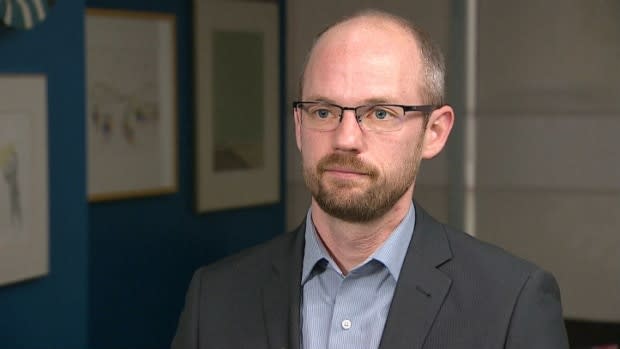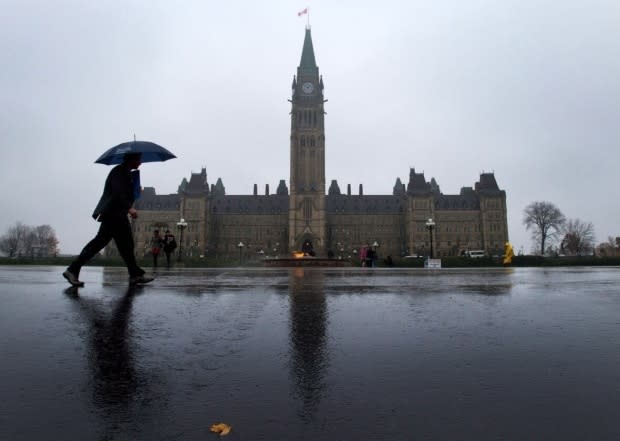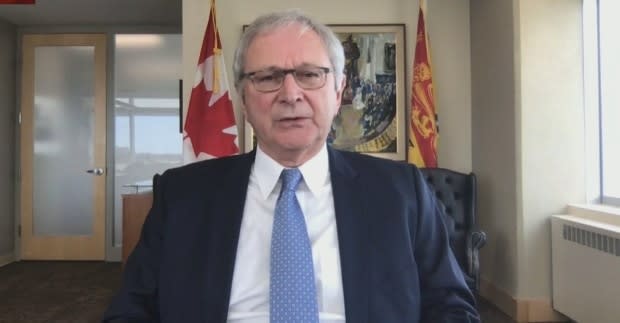N.B. fears rising federal debt and sinking economy may squeeze poor provinces
New Brunswick's receipt of federal aid has grown steeply over the last three years but as Ottawa piles on hundreds of billions of dollars in debt to support the economy through the COVID-19 crises there are creeping worries over what that might mean when the virus subsides and the bills come due.
"I'm very concerned about next year and our transfer payments because I don't know what's left in the federal government," Premier Blaine Higgs said last week.
"Given the projections of the hole being dug federally, it's like, well, we won't worry about that today. We'll worry about that tomorrow or the next day, or maybe someone believes they'll never have to worry about it. Well, for me, I'm very worried about it and very concerned."

The federal government is in no danger of running out of money, but Trevor Tombe, one of Canada's leading authorities on federal aid to have-not provinces like New Brunswick through the equalization program, says Higgs is not wrong to be nervous.
"I think the premier may have some legitimate concerns around the size of the equalization program," Tombe, an associate professor of economics at the University of Calgary, said in an interview. "Exactly how the feds balance the debt pressures that they'll be under, you know that's an important thing to think about."
Expanding Canadian prosperity over the last decade that was not matched by economic growth inside New Brunswick has triggered a windfall of federal aid for the province under Canada's $20.6 billion equalization program.

The no-strings-attached payments from Ottawa to Fredericton this year to assist with providing basic services will be a record $2.2 billion, up 25.6 per cent in just three years.
It's the single largest source of funding the New Brunswick government has — greater than its own collection of personal income or sales tax — and it has been providing the majority of revenue growth to the province in recent years.
The $450-million jump in federal aid to New Brunswick over its last three budgets has grown at triple the rate of inflation, the largest increase, in percentage terms, of the five equalization-receiving provinces, which also include Quebec, P.E.I., Nova Scotia and Manitoba.
But economic turmoil caused by COVID-19 will almost certainly halt those rapid increases in equalization and may well throw them into reverse. according to Tombe.
The $20.6-billion equalization pool from which have-not provinces are paid comes from a formula that grows based on growth in the Canadian economy over a three-year rolling average. But a significant contraction in the national economy in 2020 could easily overwhelm increases in 2018 and 2019 and trigger the first reduction in the funding pool in 17 years.
"The total number of equalization dollars is indexed to the [gross domestic product] growth rate in Canada and 2020 is almost surely going to be a year of some significant contraction," said Tombe.

"If we have a 10-plus per cent contraction in GDP in Canada, which is not an unreasonable expectation right now, that might be enough to even pull down a three-year average."
Tombe said it is impossible to know where economic growth numbers for 2020 will land, and so the final effect that will have on the equalization pool is speculative, but a $350 million reduction next year is not inconceivable.
This year New Brunswick's share of the pool is 10.7 per cent, so a reduction that size would cost New Brunswick $37.6 million in aid, if its economy performs in a similar way to other have-not provinces.
But that's if the equalization remains as it is.
A critical issue, according to Tombe, is the federal government alone is in charge of equalization and if it decides changes are required on the other side of the pandemic to deal with its own elevated debt level, or to accommodate growing demands for inclusion from provinces not covered by the program, anything might happen.
"I want to emphasize this," said Tombe. "The feds can easily decide not to follow the current formula and can enact an ad hoc change to legislation anytime.
"This is a program that is 100 per cent federal and they have full unilateral authority here. And so in principle, there could very well be changes, and there does not need to be any consultations be done."


